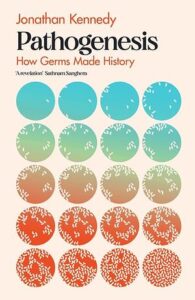 Pathogenesis, Jonathan Kennedy
Pathogenesis, Jonathan Kennedy
Pathogenesis was less absorbing for me than I’d hoped; I love non-fiction about diseases, even though I’m already studying for my MSc in the subject and thus most of it is not new to me. Still, often there are titbits I didn’t know, and that seemed like it was going to prove true here too when I read the introduction: did you know that viral genes are involved in the formation of the mammalian placenta?
But overall, the rest of it was much less scientific, less based on… well… pathogenesis, and much more about history. How diseases affected armies and governments, and how changes like capitalism (of which the author seems to be a huge fan) changed the approach to public health. Which is to say, created a demand for it, since there was no such thing under feudalism.
For someone who is interested in the history of infectious diseases in relation to humanity, this is probably still fascinating. For me, it was just a bit to starboard of my real interests, and I found it far too simplistic in discussing how diseases work. (Plus, there was definitely a lot more room to consider the impacts of the current pandemic and what it means for the future. Consider the impact on the treatment of tuberculosis, for example — deeply negative.)
It was alright, but not what I wanted, ultimately.
